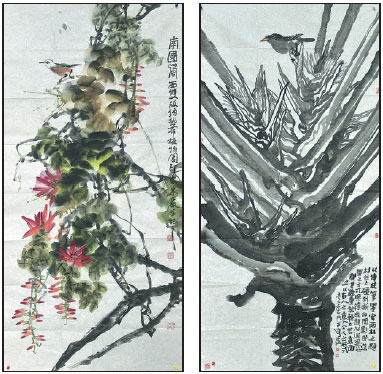
The distinctive tropical landscapes of Xishuangbanna, in southwestern Yunnan province, has been attracting established painters like Zhu Danian and Yao Zhonghua since the late 1950s. Many of them spend weeks sketching and painting at the Xishuangbanna Tropical Botanical Garden (XTBG), where a great variety of plants and birds inspire artists from across the country.
Established by the famed botanist Cai Xitao in 1959, the garden, now managed by the Chinese Academy of Sciences, is not only a scientific base for tropical biologists, but is also "a site of artistic pilgrimage" especially for painters who specialize in the traditional Chinese art of painting flowers and birds.
When Art Meets Science, an ongoing exhibition being held at the garden's Wanglian Hotel, showcases 128 ink paintings and 10 woodcuts, which provide novel perspectives to visitors wanting to learn about nature and scientists trying to understand art.
The garden covers an area of 11.25 square kilometers, and includes a tropical rain forest, which is home to more than 12,000 species of plants. It is also a shelter for birds and has become an attraction for bird watchers, particularly during the bird migration season.
The paintings feature some of the garden's most eye-catching attractions, such as flowers of the hairyfruit musella, orchids, torch lilies and peacocks.
Shi Lan, an art professor from Anhui province, whose paintings are displayed, has been a frequent visitor to the garden for the past decade.
"There is no way that I lower my head when walking through the forest, because I just cannot keep my eyes away from the flowers.
"The moment I see the red blossoms high up in the trees I'm carried away by the rhododendrons in the lower bushes and the rows of travelers' palms. Then, I spot fallen red jumble-beads scattered in the grass. I don't know what I should set my eyes on."
She says that being in the forest has taught her many lessons. "The flowers I see in a full bloom a day earlier wither away the following day. The fleeting beauty sometimes makes me feel sad, but I marvel at the circle of life."
Sun Lin, a painter from Shandong province, has sketched at the garden for a few years now. She says that nature has gradually changed her painting style. She says at first she drew the flowers and leaves precisely. "But as I stayed longer in the county where the garden is located, I learned from local people to live simply and to observe the world quietly. And now, I skip many details, but I try to grab the essence of the subject I am painting."
The rich colors of the garden are what many painters come for. But for some, the green plants have a lingering charm.
In his ink painting, Beijing-based Pang Congcong portrays a giant taro whose huge leaves leave him feeling refreshed. "It doesn't have colorful blossoms or plump fruits. Still, it exhales a breath of warmth and vigor."
After viewing the exhibition, Tang Hong, from Qingdao, Shandong province, who works on the garden's landscape, says the paintings not only introduce species to people, but also tells them that it is these small plants and animals, not humans, that are the real residents of the forest.
Chen Jin, the garden's director, says the exhibition is a tribute to the diverse beauty of Xishuangbanna's rain forests.
"Generations of painters have come here to sketch over several decades. Some have even visited 26 times. It has become a unique cultural phenomenon in Yunnan."
He says both painters and scientists hope the exhibition leads to a cross-disciplinary exchange and he hopes to develop the exhibition into a biennial event.


86-10-68597521 (day)
86-10-68597289 (night)

86-10-68511095 (day)
86-10-68512458 (night)

cas_en@cas.cn

52 Sanlihe Rd., Xicheng District,
Beijing, China (100864)

